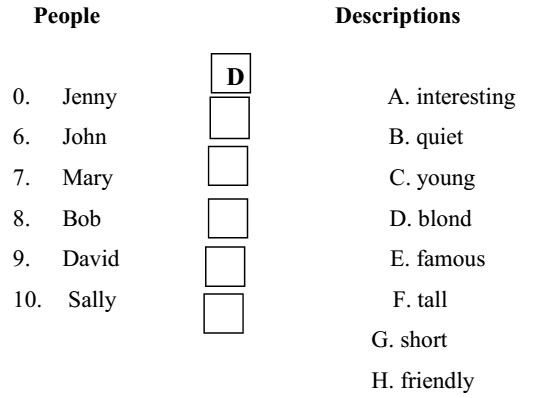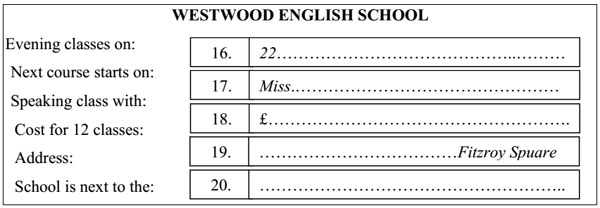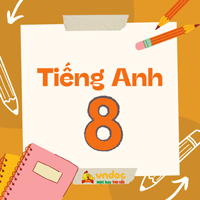Đề thi chọn học sinh giỏi cấp huyện môn Tiếng Anh lớp 8 Phòng GD-ĐT Ý Yên, Nam Định năm học 2015 - 2016
Đề thi chọn học sinh giỏi môn Tiếng Anh lớp 8 năm 2016 có đáp án
Trong bài viết này, mời các em học sinh cùng quý thầy cô tham khảo Đề thi chọn học sinh giỏi cấp huyện môn Tiếng Anh lớp 8 Phòng GD-ĐT Ý Yên, Nam Định năm học 2015 - 2016 có kèm đáp án chi tiết. Sau đây mời các em cùng thử sức nhé!
Tuyển tập 10 đề thi học sinh giỏi môn tiếng Anh lớp 8
Đề thi học sinh giỏi môn tiếng Anh lớp 8 huyện Yên Mô, Ninh Bình năm học 2014 - 2015
Đề khảo sát học sinh giỏi môn Tiếng Anh lớp 8 Phòng GD-ĐT Tiền Hải, Thái Bình năm học 2015 - 2016
|
PHÒNG GIÁO DỤC - ĐÀO TẠO HUYỆN Ý YÊN -------------- ĐỀ CHÍNH THỨC
|
ĐỀ KHẢO SÁT CHẤT LƯỢNG HỌC SINH GIỎI THCS NĂM HỌC 2015 – 2016 MÔN: TIẾNG ANH - LÓP 8 Thời gian làm bài: 150 phút Đề gồm 08 trang |
A. LISTENING. (4.0 points)
Hướng dẫn phần thi nghe hiểu:
- Nội dung nghe gồm 4 phần, mỗi phần thí sinh được nghe 2 lần, đĩa CD tự chạy 2 lần;
- Mở đầu và kết thúc phần nghe có tín hiệu nhạc;
- Hướng dẫn làm bài chi tiết cho thí sinh (bằng tiếng Anh) đã có trong bài nghe.
Part 1: Questions 1 – 5. (1 point)
You will hear five short conversations. You will hear each conversation twice. There is one question for each conversation.
For questions 1-5, put a tick () beside the right answer.
EXAMPLE
0. How many people were at the meeting?
A. 13 B. 3 C. 30
1. When will they go on holiday?
A. September B. August C. June
2. How is Patti going to travel?
A. by train B. by car C. by plane
3. What will Sam do?
A. send a postcard B. phone C. send a letter
4. What was the weather like in Portugal?
A . sunny B. cloudy and rainy C. cloudy
5. What has the girl broken?
A. a bottle B. a glass C. a picture
Part 2: Questions 6-10. (1 point)
Listen to Sarah and Matthrew talking about the people they met at a party.
What do they say about each person? For questions 6-10, write a letter A-H next to each person.
You will hear the conversation twice.

Part 3: Questions 11-15. (1 point)
Listen to a woman asking a travel agent for some information about a park in the mountains.
For questions: 11-15, tick () A, B or C. You will hear the conversation twice.
EXAMPLE:
0. The woman will visit the park for......................
A. one week B. two weeks C. four weeks
11. In the park, there is.......................................
A. a hotel B. a café C. a guest-house
12. The village has a..................................
A. food shop B. cinema C. swimming pool
13. You can only go through the park...................
A. on foot B. by bus C. by car
14. In the park, the woman will see....................
A. animals B. snow C. flowers
15. On weekdays, a visit to the park costs..........................
A. $13 B. $12 C. $16
Part 4: Questions 16-20. (1 point)
You will hear a man asking for information about the Westwood English School.
Listen and complete questions 16-20.
You will hear the conversation twice.

B. GRAMMAR AND VOCABULARY: (5,0 points)
I. Choose the word whose underlined part is pronounced differently from that of the others. (0,5 point)
|
1. |
A. |
departure |
B. |
heritage |
C. |
degree |
D. |
requirement |
|
2. |
A. |
post |
B. |
result |
C. |
crystal |
D. |
install |
|
3. |
A. |
competition |
B. |
compile |
C. |
connect |
D. |
concern |
|
4. |
A. |
underline |
B. |
hust |
C. |
jungle |
D. |
bulletin |
|
5. |
A. |
carol |
B. |
canoe |
C. |
marine |
D. |
adjust |
II. Choose the word whose main stress is places differently from the others. (0,5 point)
|
1. |
A. |
experiment |
B. |
emergency |
C. |
acommodation |
D. |
itinerary |
|
2. |
A. |
accessible |
B. |
injection |
C. |
departure |
D. |
adequate |
|
3. |
A. |
decompose |
B. |
buffalo |
C. |
gallery |
D. |
overhead |
|
4. |
A. |
lava |
B. |
canoe |
C. |
brochure |
D. |
include |
|
5. |
A. |
valley |
B. |
import |
C. |
prison |
D. |
brother |
III. Circle the letter A, B, C, or D to indicate the correct answer to each of the following questions. (2.0 points)
1. My mother is always.....................about the things I bought.
A. complaining B. complain C. complains D. to complain
2. My Son........................as a world heritage site by UNESCO.
A. recognizes B. recognized C. is recognizing D. was recognized
3. He came to see me yesterday. He came in while I ........................my homework.
A. do B. is doing C. was doing D. did
4. My friend advised me ....................to go from Hanoi to Sa Pa.
A. what B. where C. how D. why
5. Computers have been ...................widely all over the world nowadays.
A. in use B. on use C. of use D. with use
6. Can I borrow your toaster? I'd like to make some toast....................my breakfast.
A. with B. for C. in D. at
7. His son hurts himself badly when he fell ...................the high-fence.
A. down B. out from C. out of D. over
8. The teenagers prefer pop music....................traditional music.
A. than B. but C. and D. to
9. Are you..........................with your composition?
A. satisfy B. satisfied C. satisfaction D. satisfying
10. The Riverside Hotel is expensive, .........................it has a gym.
A. however B. but C. moreover D. so
IV. Give the correct form of the verb in brackets: (1,0 point)
1. I would rather you (go).................................to bed now.
2. Have they got used to (live).....................................in the city?
3. The woman (sit)...................in front of me was wearing a big hat, so I couldn't see anything.
4. .....................telephone (invent)...................................by Alexander G. Bell?
5. While I was studying last night, Fred (drop)..................................by to visit me.
6. George together with his family often (go).........................to spain for holidays yearly.
7. Aluminium is a valuable metal that (can, use).....................................again and again.
8. A young man and his wife (drive)............................through the countryside in Oxfordshire when they saw a girl (stand)..........................by the road. At first, they carried on driving, but the wife said, "It (get).............................dark, she might have wanted a lift... ."
V. Fill each gap with the correct form of the word in brackets. (1.0 point)
|
1. Mount Everest is noted for its …………………………………… 2. Study is no longer………………………………….. 3. This restaurant is ……………….……………for its western meals. 4. I hope that this arrangement is…………………………….to you. 5. Nam put………..……………….on that towel to stop the bleeding. 6. Never force a(n)…………………….……..person to sit or stand. 7. It’s advisable to recycle used things to save……………….…….resourses. 8. It was raining cats and dogs when he……………………………… 9. They had a day to visit all the tourist ……………………………….. 10. You will meet the tour guide on your……………………..at the hotel. |
(BEAUTIFUL) (RESTRICT) (FAME) (AGREE) (PRESS) (CONSCIOUS) (NATURE) (DEPARTURE) (ATTRACT) (ARRIVE) |
C. READING: (6 points)
I. Read the passage and circle the best answer among A, B, C or D for each space.(2 points)
CARTOON FILMS
Cartoon films have very few limits. If you can draw something, you can (1)............it move on the cinema screen. The (2)..................of new ideas and advanced computer programs means that cartoons are becoming exciting again for people of (3)................ages.
(4).............. the end of the 1970s, the cinema world had decided that cartoons were only for children.
But soon (5).............., one or two directors had some original new ideas. They proved that it was possible to make films in which both adults and children could (6)..............the fun.
However, not (7).....................cartoon film was successful. The Black Cauldron, for example, failed, mainly because it was not too (8).......................for children and too childish for adults. Directors learnt from this (9)....................., and the film companies began to make large (10)...................of money again.
|
1. |
A. |
make |
B. |
wish |
C. |
cause |
D. |
get |
|
2. |
A. |
usage |
B. |
using |
C. |
use |
D. |
used |
|
3. |
A. |
these |
B. |
all |
C. |
other |
D. |
more |
|
4. |
A. |
at |
B. |
on |
C. |
in |
D. |
by |
|
5. |
A. |
then |
B. |
next |
C. |
later |
D. |
afterwards |
|
6. |
A. |
share |
B. |
mix |
C. |
add |
D. |
divide |
|
7. |
A. |
each |
B. |
any |
C. |
both |
D. |
every |
|
8. |
A. |
frightening |
B. |
afraid |
C. |
fearful |
D. |
nervous |
|
9. |
A. |
fault |
B. |
mistake |
C. |
crime |
D. |
damage |
|
10. |
A. |
totals |
B. |
numbers |
C. |
accounts |
D. |
amounts |
II. Read the text below. For questions 1 - 5 you are to choose one best answer (a), (b), (c), or (d) to each question. (1.0 pt)
During the teenage years, many young people can at times be difficult to talk to. They often seem to dislike being questioned. They may seem unwilling to talk about their work in school. This is a normal development at this age, though it can be very hard for parents to understand. It is part of becoming independent, of teenagers trying to be adults while they are still growing up. Young people are usually more willing to talk if they believe that questions are asked out of real interest and not because people are trying to check up on them.
Parents should do their best to talk to their son or daughter about school work and future plans but should not push them to talk if they don't want to. Parents should also watch for the danger signs: some young people in trying to be adults may experiment with alcohol or smoking. Parents need to watch for any signs of unusual behaviors which may be connected with these and get help if necessary.
1. This is from a.........
a) parent's handbook b) teenage magazine c) school timetable d) children's book
2. What is the writer trying to do?
a) to be helpful b) to be amusing c) to be questionable d) to be sorry
3. Why do adults sometimes find teenagers difficult?
a) because most teenagers are quiet.
b) because teenagers don't want to talk to their parents.
c) because teenagers think adults are not honest.
d) because most teenagers hate adults.
4. When can you expect a young person to be more talkative than usual?
a) When adults give them a lot of money to spend.
c) When adults talk to them about something other than their work in school.
d) When adults talk to them about alcohol and smoking.
đ) When people talk to them because they are really interested and not yet checking up on them.
5. Some teenagers experiment with drinking or smoking because......
a) cigarettes and alcohol are cheap.
b) women like a smoking and drinking man.
c) they regard it as a mark of adulthood.
d) cigarettes and alcohol are available everywhere.
III. Fill in each space with a suitable words to complete the following passage: (2.0 points)
Sydney has a (1)...............................of 3.700,000. It is Australia's largest and oldest city and it is built around the harbour, named Port Jackson. Captain Cook called it this (2)......................he sailed to the area in 1770. Sydney was not planned from the start, as many later Australian cities were. It has a tight, congested centre without wide baulevards. But it is a very (3)...........................city, with the most energy and style of all Australian cities.
In Sydney, the buildings are higher, the colors are brighter and the nightlife is (4).................... exciting. North of the harbour is more residential, and the south is more industrial. The two shores are (5).............................by the Sydney Harbour Bridge, which was built in 1932. The city centre is South of the harbour.
Sydney's most famous building the Opera House, was (6)...........................in 1973. Designed in the 1950s by a young Danish architect, Joern Jackson. It is supposed to look like sails in the wind. It took 16 years to (7)......................... . The best place to (8)............................shopping is George Street and Pitt Street. The post Office is on Martin Place. The (9)....................in New South Wales is generally warm, though it can get a little cold in winter. There are some of the best beaches in the world, notably Bondi Beach and Manly. Tourists offices are open five days (10)....................week from 9 a.m to 5 p.m.



